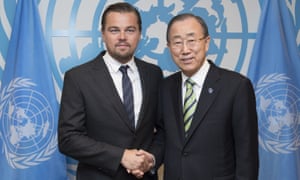It was a spectacular signal of global intent on Friday when more than 170 governments signed up to the Paris deal. But it's just the start of a long, hard road
 |
| UN secretary-general Ban Ki-moon and actor Leonardo DiCaprio at the UN in New York on 22 April 2016. 'Now the gap between reality and the ambition of holding global warming below 2C needs addressing.' Photograph: UPI/Barcroft Media |
In the UK, 10 years after David Cameron hugged that husky, his record is in tatters. Not only has "the green crap" been whittled back by big cuts in subsidies and incentives that have left solar power, onshore and even offshore wind all less attractive, but policies to limit emissions have been repeatedly portrayed as harmful to the economy. High energy costs have been widely blamed for the crisis in British steel. Yet, while it is true that energy prices are higher than elsewhere in Europe – partly because of climate change programmes and partly because of the fragmented nature of the privatised industry largely beyond government control – they are mitigated by compensation. As fact-checkers point out, for steel, actual energy costs amount to around just 1% of total manufacturing costs. The double whammy of an uncompetitive currency and a slump in global demand are the real problems that Tata and other steelmakers are facing. Energy costs get the blame because that's where the government might have real traction.
As divestment lobbies chalk up triumph after triumph, there are signs of parallel trends. In the past few days, Norway's sovereign wealth fund has pulled out of scores of companies for being over-reliant on fossil fuel, and the Rockefeller Foundation has divested from fossil fuel entirely. Yet governments still resist the commitment to greening their economies that will turn the Paris deal from an exercise in global cooperation to a watershed for global warming.
Links

No comments:
Post a Comment